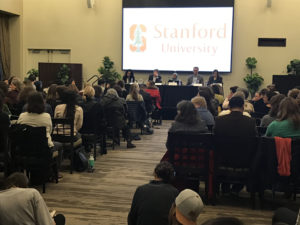SLS Provides Expertise and Assistance to Those Affected by Recent Immigration Executive Orders
Three recent executive orders from the Trump Administration have targeted immigrant communities for additional enforcement and scrutiny. Of the three — on border security, public safety and the travel ban, the most publicized has been the travel ban executive order, which resulted in chaos and concern at national airports and beyond. Stanford law faculty and students have responded to the executive orders in multiple ways.
-

Legal experts from Stanford Law School participated in a panel discussion discussing recent executive orders affecting immigrants.
On February 2, legal experts from Stanford Law School participated in a university-wide panel discussion on the executive orders. Nearly 200 students, alumni, faculty, and staff gathered to hear professors Pamela S. Karlan, Jayashri Srikantiah, Shirin Sinnar, Lucas Guttentag and Lecturer Steven Shapiro provide context from their respective areas of expertise. The panelists covered the history of executive orders, presidential power, the content of the executive orders, forecast of possible upcoming policy changes, and a historical context on immigration. Professor Jayashri Srikantiah, director of the Immigrants’ Rights Clinic at Stanford Law School, stated, “[the executive orders are] worded very broadly and very vaguely which leads to a condition of uncertainty, and it is therefore important to be vigilant as these orders are implemented.” Srikantiah also noted regional variation in implementation and urged students, faculty, and staff with questions and concerns about their own immigration status to attend an event happening later that same day for those directly affected.
After speaking about different aspects of the travel ban, the five legal experts answered a range of important questions from close to 20 audience members. These questions reflected the rumors and uncertainty that the travel ban has caused, with questions about whether other countries will be added to the ban, if greencards could be revoked, and about the hold on adjustment of status applications that affects graduating students and recent alumni in the country on student visas.
Later that evening, the Law School’s Immigrants’ Rights Clinic partnered with law students in the recently-formed Student Advocates for Immigrant Rights (SAIR) to hold an event for those in the campus community directly impacted by the travel ban executive order. The event began with a “know your rights” presentation that addressed the legal and practical issues faced by Stanford community members. The clinic and SAIR students then provide individual pro bono legal advice to affected members of the Stanford community, including students, researchers, and faculty.
Since the executive order travel ban was issued, the Immigrants’ Rights Clinic has been closely involved in efforts to assist those affected, providing individualized pro bono advice sessions, assisting travelers at San Francisco International Airport, and working alongside community-based organizations to prepare for the Trump Administration’s implementation of other provisions of the executive orders. Clinic faculty and staff have also spoken at community forums and advised the Stanford community in numerous formal and informal ways.
Formore information and resources, visit Stanford University’s Immigration Policy Issues website.
